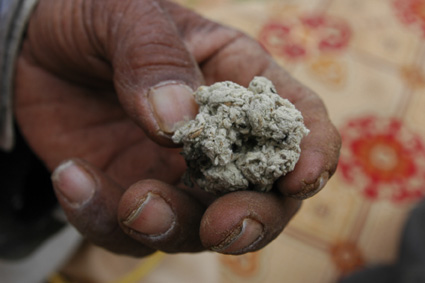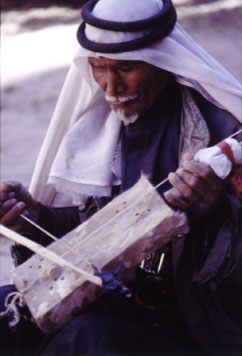The Bedouin Shaman's (Fugara) Of Jordan
Most Bedouins use the word ''Fugara'' to refer to their Shamans. Fugara is an aspect of Desert Mysticism. It consists of meditative, mystical and magical practices which were taught from father to son by oral tradition. The Bedouin Fugara maintains a surprising internal coherency of practice and belief.
Fugara is an individual member of a tribe who provides healing, advice, teaching or spiritual meaning through mediation sometimes in altered states of consciousness. Although such states of consciousness may vary from tribe to tribe, they may be achieved by various methods including music, chanting, repeating God's attributes, druming, meditation, solitude, dreaming.
Fugara means "weak" since most of the bedouin shamans ''Fugara'' abstain from eating hefty meals. Not surprisingly, the result is a skinny look and a weak body, hence the name. "Fugara" are initiated when they are young, sometimes as young as 14 years old. After the initiation, nothing is hidden from them any longer; not only can they see things far, far away, but can also discover souls, stolen souls, stolen objects, hidden treasures, hidden remedies and other intelligence gathering. The Fugara makes a journey during which he is spoken to by the spirits, or they may appear to him in the form of visions or even in physical form. He knows the mystery of the breakthrough in plane. This communication among the cosmic zones is made possible through his training on the techniques, names and functions of spirits, mythology and genealogy of the clan, and secret language.
The nomadic bedouin Shamans assumes a socio-religious function within the community. The shaman may fill the role of priest or sheik, metaphysician or healer.
Bedouins Shamans use many plants for medical purposes and spiritual rites. Harmala, mixed with incense, is used for curing people possessed by the jinn, a treatment that often includes the beating of drums and the recitation of Koranic verses.
All shamanic practice aims to give rise to ecstasy. Drumming, manipulating of breath, ordeals, fasting, theatrical illusions, all are time-honored methods for entering into the trance for shamanic work.
Healing with language: Perhaps no people in the world manifest such enthusiastic admiration for literary expression and are so moved by the word, spoken or written, as the Arabs. Hardly any language seems capable of exercising over the minds of its users such irresistible influence as Arabic.
Many Shamans view the Koran as the word of God and Arabic as the language of creation. In this view the alphabet and language are divine and have immense magical power. The Bedouin shaman or Fuqara heals his people through transmitting some verses contained in the Koran. Zikr, simply translated as "divine remembrance", is also practiced as a method to cure mental or physical illness. It is performed by repeating holy verses or God's attributes individually. The shaman combines the using of God's attributes and holy verses with prayer in a specific and complex method.
The formulation, called "wifq", may be written on paper, bone, or leather and is placed in a glass of water (to be taken by the patient), buried in the ground, or carried around by the patient. The formulations can also be spoken aloud, in the heart, or using many other ways. This can be applied not only to cure mental or physica illness, but also to solve family, financial, or social problems. This last method uses power from God for constructive purposes only, and is not similar to voodoo, black magic, or witchcraft, which use the power from jinn or evil spirits for destructive purposes.
The Bedouins explained phenomena that affected their life significantly by the intervention of superhuman entities, be they gods or demons. These entities are divided into three categories: ancestors, the gods, and the djin or Jinn.''
''Jinn are said to have come the Earth ages before man existed. They were the first of Earth's masters. They built huge cities whose ruins still stand in forgotten places. Aeons later many Jinn were forced to flee the Earth while other were imprisoned. Still others roam desolate places to this day. The Jinn are said to be invisible to normal men.








Salem Zae'er is a traditional doctor who lives in Wadi Rum. His family renowned for its ability to exercise the Djin from any person who is possessed. The Djin would be expelled from the interface between the flesh and the fingernail.
Al-Jailani spoke also about the four posts or stakes which indicate the gateway to the two orients and two occidents. Each gateway has a power/guardian, and the secret to them are known only to Al Rifai, Al Dasouqi, Al Jailani, and Al Sayyed Ahmad who were entrusted each on a specific shamanistic task. To fulfil their tasks, they spread in the four directions, and since each one has become the patron of his direction.
The angels, according the Bedouin shaman, are innumerable, and each one of them has a letter of the alphabet. They include the bearers of the throne, the guardian of the skies, and those that guard humans against sin. People can talk to the angels, but the latter do not talk back. Only the virtuous can speak to the angels, and they can only ask them for good deeds because the angels are only of pacific acts.
Dwell in the area where he lives (the south of Jordan) in large numbers. he exorcised many people by the grace of God through reciting the names of Gad, which expelled the djin through the fingernails of these people.
According to Al-Jailani, a Bedouin Shaman, Lot's people were notorious for their conduct that attracted the wrath of God. For example, they preferred homosexuality to heterosexuality. God sent two handsome angels to punish them. Lot's people sought the angels at Lot's house to have sex with them. Lot chastised them severely for such lasciviousness, and offered them his daughters instead, but they refused and planned perfidious acts that would anger the angels and God.
Hamad Issa Al-Ouaini, who lives in the Jordan Valley, Believes that the cure foe epilepsy is the language of the Koran. The patient needs the help of someone who is versed in dealing with the Djin (to which he also refers as spirits).
*Written by Rami Sajdi, Copyright © Rami Sajdi 1997 All Rights Reserved




